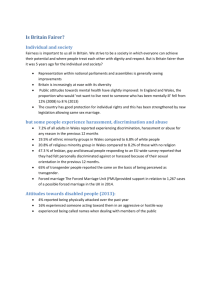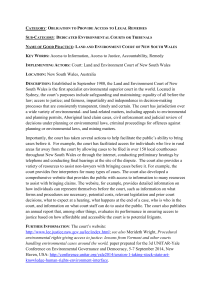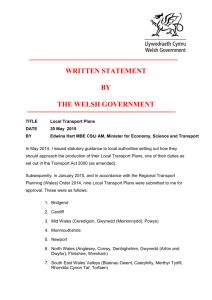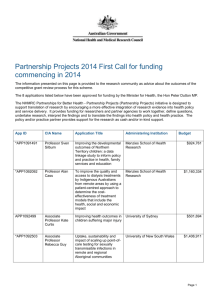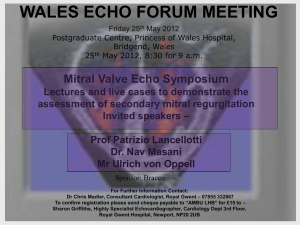BBC genealogy guide
advertisement
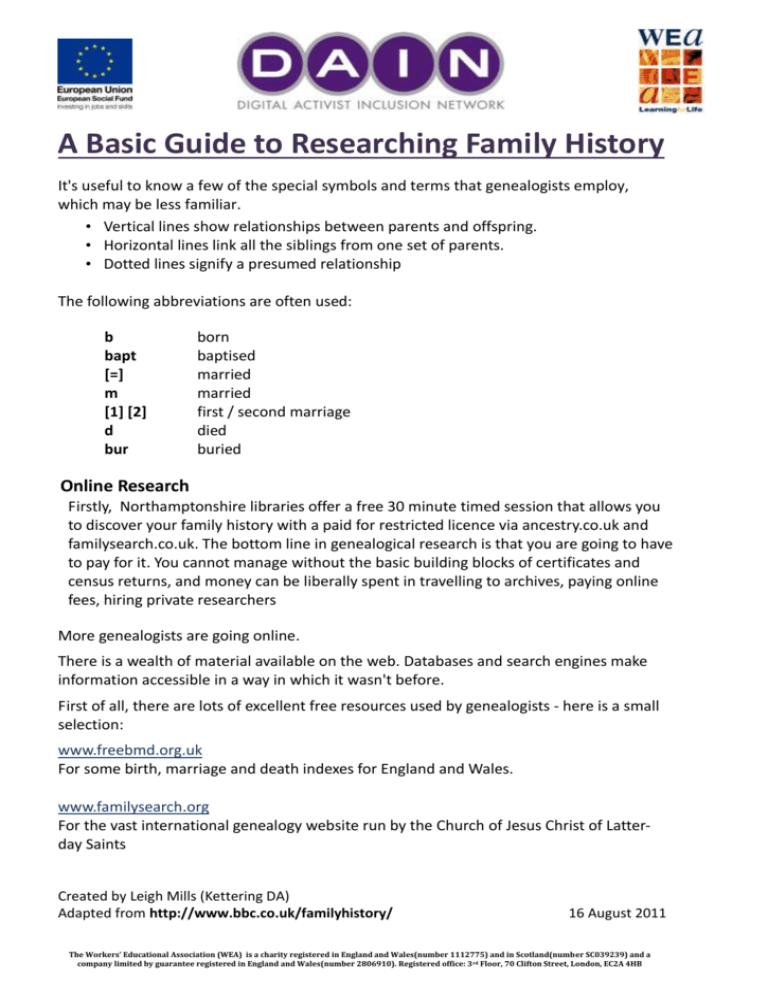
A Basic Guide to Researching Family History It's useful to know a few of the special symbols and terms that genealogists employ, which may be less familiar. • Vertical lines show relationships between parents and offspring. • Horizontal lines link all the siblings from one set of parents. • Dotted lines signify a presumed relationship The following abbreviations are often used: b bapt [=] m [1] [2] d bur born baptised married married first / second marriage died buried Online Research Firstly, Northamptonshire libraries offer a free 30 minute timed session that allows you to discover your family history with a paid for restricted licence via ancestry.co.uk and familysearch.co.uk. The bottom line in genealogical research is that you are going to have to pay for it. You cannot manage without the basic building blocks of certificates and census returns, and money can be liberally spent in travelling to archives, paying online fees, hiring private researchers More genealogists are going online. There is a wealth of material available on the web. Databases and search engines make information accessible in a way in which it wasn't before. First of all, there are lots of excellent free resources used by genealogists - here is a small selection: www.freebmd.org.uk For some birth, marriage and death indexes for England and Wales. www.familysearch.org For the vast international genealogy website run by the Church of Jesus Christ of Latterday Saints Created by Leigh Mills (Kettering DA) Adapted from http://www.bbc.co.uk/familyhistory/ 16 August 2011 The Workers’ Educational Association (WEA) is a charity registered in England and Wales(number 1112775) and in Scotland(number SC039239) and a company limited by guarantee registered in England and Wales(number 2806910). Registered office: 3 rd Floor, 70 Clifton Street, London, EC2A 4HB www.rootsweb.com For genealogy chat and all kinds of relevant information. Here are some examples of pay-for sites for basic genealogy: www.genesreunited.co.uk Contains (among much else) birth, marriage and death indexes and census returns for England and Wales www.familyrelatives.com contains (among much else) birth, marriage and death indexes and census returns for England and Wales www.ancestry.co.uk contains (among much else) birth, marriage and death indexes and census returns for England and Wales www.scotlandspeople.gov.uk contains (among much else) birth, marriage and death indexes for Scotland and digitised images of many of the certificates and census returns for Scotland. www.findmypast.co.uk contains (among much else) birth, marriage and death indexes and census returns for England and Wales. Digging deeper When you have done your basic genealogy and built a skeleton family tree, it is time to investigate more specialised websites, for example, those containing military or employment records, parish records or wills. Here are some features shared by many of the excellent sites - and some questions that you might like to ask: Does the site (or may it) contain information relevant to your ancestor? If your grandfather was a merchant seaman, for example, does this site contain seamen's records for the period during which he served? http://certificateexpress.org/uk The Official Provider of Vital Records Forms - When you need birth certificates, marriage, divorce, or death records, Is there a full description of the records that are held on the site? Created by Leigh Mills (Kettering DA) Adapted from http://www.bbc.co.uk/familyhistory/ 16 August 2011 The Workers’ Educational Association (WEA) is a charity registered in England and Wales(number 1112775) and in Scotland(number SC039239) and a company limited by guarantee registered in England and Wales(number 2806910). Registered office: 3 rd Floor, 70 Clifton Street, London, EC2A 4HB Here are some examples of pay-for sites used by genealogists researching specialist information: http://www.nationalarchives.gov.uk/documentsonline This contains wills, the World War I Campaign Medal index, several collections of naval records and much more. http://www.originsnetwork.com This contains numerous specialised records relating to British genealogy, including wills, apprenticeship records, military records and marriage indexes. http://archive.timesonline.co.uk The Times Digital Archive, which can be searched from 1785-1985, is a great place to find ancestors who were sufficiently well-to-do, famous or notorious to get themselves a mention. And remember that there are some great specialist sites that are available for free. One of the most popular among genealogists is the Commonwealth War Graves Commission website, where you can find details of servicemen and women who died during the two World Wars: http://www.cwgc.org If you are in need of a piece of advice, or wondering where you can find your next piece of information, have a look at the following free sites. You can use these sites to make contact with the genealogy community. www.genuki.org.uk A reference site packed with information, advice and valuable genealogical material. www.cyndislist.com A genealogical gateway, containing a wealth of information and links to hundreds of websites. Find out more: Books The Genealogist's Internet by Peter Christian (The National Archives, 2003) Track Down Your Ancestors: How to Research Your Family History Using Archives and the Internet by Estelle Catlett (2010) Tracing Your Family History on the Internet by Chris Paton (Pen and Sword, 2011) Created by Leigh Mills (Kettering DA) Adapted from http://www.bbc.co.uk/familyhistory/ 16 August 2011 The Workers’ Educational Association (WEA) is a charity registered in England and Wales(number 1112775) and in Scotland(number SC039239) and a company limited by guarantee registered in England and Wales(number 2806910). Registered office: 3 rd Floor, 70 Clifton Street, London, EC2A 4HB
